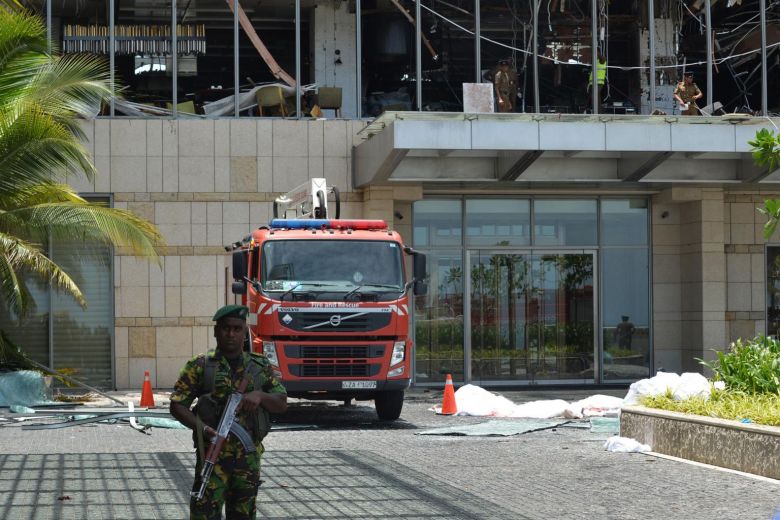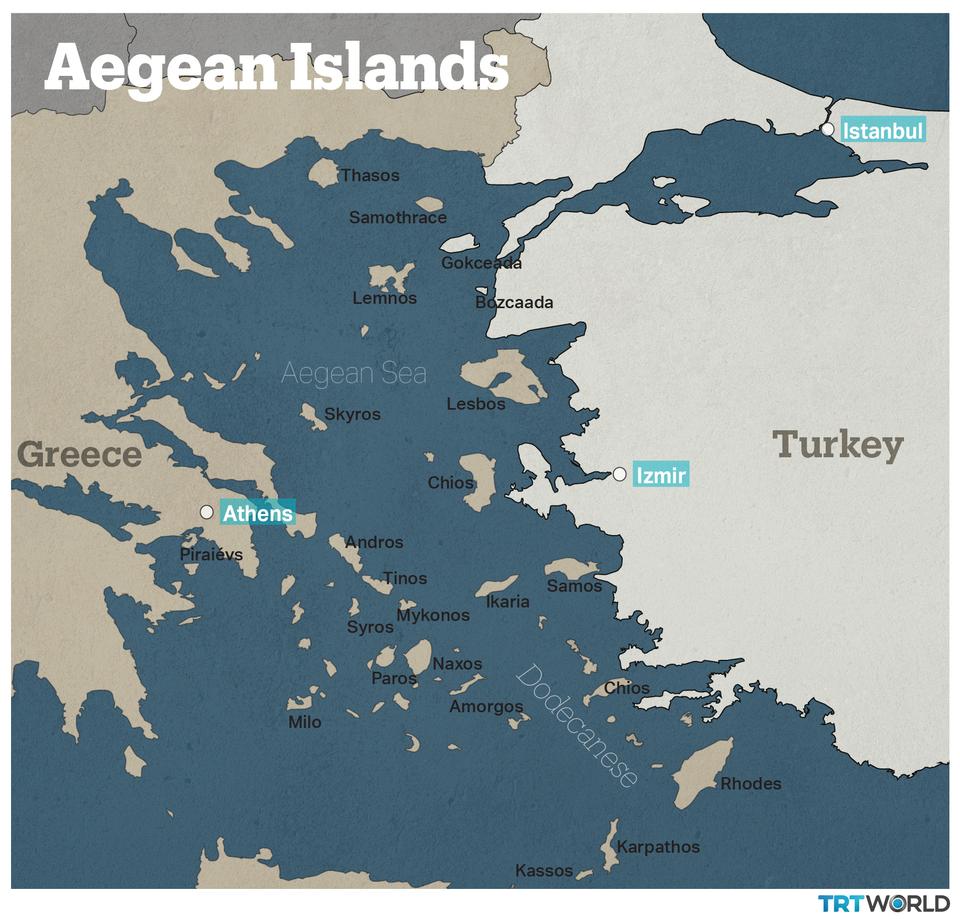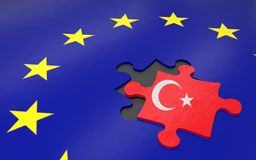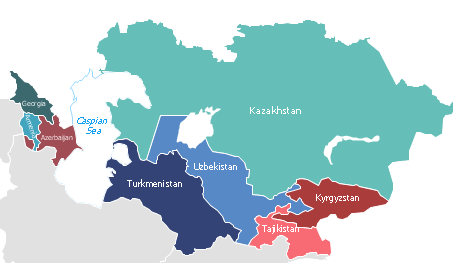
After the heinous terrorist attacks that took place in Sri Lanka on 21 April, an opinion piece with the title "As the Sri Lanka attacks show, Christians worldwide face serious persecution" by Giles Fraser was published in The Guardian newspaper on the same day.[1] The Guardian introduces the author as "a parish priest in Elephant and Castle, south London." In the past, the author had a weekly column in Church Times, an Anglican Christian weekly newspaper based in London.
In the opening short paragraph of his opinion piece, Giles Fraser briefly refers to the terrorist attacks to various churches in Sri Lanka. However, he does not provide any information concerning the history of Christianity in this mainly Buddhist country or the problems faced by Christianity, if any, as a minority religion. He does not give information on the fact that the Christian population of Sri Lanka includes members of both the Sinhalese and Tamil ethnic groups.
Following this short introduction, he mentions a conversation with a known scholar and classicist “about Christian persecution in Roman times” and states that “she [the classicist] was of the opinion that it might not have been quite as big a deal as later Christians made it out to be.” He then makes the ultimate claim of his opinion piece; “We are living though one of the most serious phases of Christian persecution in history, and most people refuse to acknowledge it.”
It is known that the month of April is a period for propagandists and their blindfolded supporters to perform the yearly rituals of repeating their false genocide claims concerning the 1915 Events. Being an “anniversary”, the month of April provides is a good occasion for propagandists to engage in brainwashing. The main target group of this propaganda is the Christian Western world and their ultimate tool for the propaganda is religion, namely Christianity. The popular enemy groups for these “Christianists” are Turks and Muslims. They use hostility against Turkish and Islamic identity, namely Turcophobia and Islamophobia, as tools for their propaganda efforts fueled by a primitive and destructive revenge mentality.
In his opinion piece, parish priest Fraiser, under the pretext of Sri Lanka terror attacks, adds his voice to this anti-Turkish and anti-Islam choir and claims that “During the past century, Christianity has been all but driven out of the Middle East, the place of its birth.” He, without explaining the legal meaning of “genocide” and mentioning the “Convention on the Prevention and Punishment of the Crime of Genocide” adopted by the General Assembly of the United Nations on 9 December 1948, ignorantly accuses Turkey of committing the crime genocide.
In this context, he also introduces a new book which he notifies will be published in coming days written by two Israeli professors, Benny Morris and Dror Ze’evi from Ben Gurion University of Negev. He states in this respect that “This week, the Israeli historians Benny Morris and Dror Ze’evi will publish a much awaited account of the period. The Thirty-Year Genocide: Turkey’s Destruction of its Christian Minorities argues that from 1894 to 1924, the Turkish authorities systematically murdered some 2.5 million Christians.”
Who are the authors of the book “The Thirty-Year Genocide: Turkey’s Destruction of its Christian Minorities”?
A brief scan of the names of the authors of the said book points out that Benny Morris is an Israeli professor who “identifies himself as a Zionist and supports Zionist actions”.[2] It is reported in the press that Morris, “in a 2004 interview published in Haaretz, justified the ethnic cleansing of Palestinian” known as Nakba (al-Nakbah is disaster or catastrophe) in which more than 700,000 Palestinian Arabs fled or were expelled from their homes.[3] According to the reports, “Morris justified the ethnic cleansing of Palestinians. Invited to reassess those remarks in the latest interview, the historian doubled down. While apparently regretting some of his language, Morris continued to back the population expulsions that took place.”
The Haaretz interview with Benny Morris bears the heading of “Survival of the Fittest”[4]
The Haaretz interview of 2004 with Morris interestingly bears the heading of “Survival of the Fittest”, which is in fact the motto of Eugenics, Social Darwinism and the social theory of the natural selection of human beings. The following passages from this interview explains why the heading of the interview bears a Social Darwinist and Eugenic motto:
“(Ari Shavit, Haaretz Correspondent) Are you saying that Ben-Gurion was personally responsible for a deliberate and systematic policy of mass expulsion?
(Benny Morris) From April 1948, Ben-Gurion is projecting a message of transfer. There is no explicit order of his in writing, there is no orderly comprehensive policy, but there is an atmosphere of [population] transfer. The transfer idea is in the air. The entire leadership understands that this is the idea. The officer corps understands what is required of them. Under Ben-Gurion, a consensus of transfer is created.
(Ari Shavit) Ben-Gurion was a "transferist"?
(Benny Morris) Of course. Ben-Gurion was a transferist. He understood that there could be no Jewish state with a large and hostile Arab minority in its midst. There would be no such state. It would not be able to exist.
(Ari Shavit) I don't hear you condemning him.
(Berry Morris) Ben-Gurion was right. If he had not done what he did, a state would not have come into being. That has to be clear. It is impossible to evade it. Without the uprooting of the Palestinians, a Jewish state would not have arisen here.”
It is quite amazing to see that Morris in this interview openly defends ethnic cleansing, forced deportations and relocations for the creation of a Jewish state. The interviewer explains his observations concerning Morris’ mood as follows:
“He doesn't think twice before firing off the sharpest, most shocking statements, which are anything but politically correct. He describes horrific war crimes offhandedly, paints apocalyptic visions with a smile on his lips. He gives the observer the feeling that this agitated individual, who with his own hands opened the Zionist Pandora's box, is still having difficulty coping with what he found in it, still finding it hard to deal with the internal contradictions that are his lot and the lot of us all.”
In this context, I would like to also refer to further explanations of Morris concerning his above-mentioned words on “ethnic cleansing”. His explanation was published in the Haaretz newspaper as well. Relevant parts of the explanation is as follows:
“I do not support the expulsion of Arabs from the territories or from the State of Israel! Such an expulsion would be immoral, and is also unrealistic. What I said was, that if in the future, these communities were to launch massive violence against the State of Israel in combination with a broad assault on Israel by its neighbors, and endanger its survival, expulsions would certainly be in the cards”[5]
This explanation of Morris should be analyzed by the Turkish scholars in the future from the point of view of the relocation of Armenians in the Ottoman Empire due to Armenian revolutionary committees’ rebellion against the government and their cooperation with the invaders of the country during the First World War that presented a life-or-death moment for the Turkish people. Furthermore, unlike the Israeli case, there was no deportation and the Ottoman government envisioned the relocation of its Armenian population as a temporary measure and provided the legal and administrative opportunity for the Armenians to return to their homes once the security risk borne out of the war would subside. In this context, the preparation of this book by an openly remorseless and discriminatory individual such as Morris takes on a comical aspect.
When will the book be published and by whom?
It is indicated that the 672 pages book titled “The Thirty-Year Genocide: Turkey’s Destruction of Its Christian Minorities, 1894–1924” will be published by Harvard University Press today, on 24 April 2019.[6] The Harvard University Press is introducing the book in the following way;
“A reappraisal of the giant massacres perpetrated by the Ottoman Empire, and then the Turkish Republic, against their Christian minorities.
Between 1894 and 1924, three waves of violence swept across Anatolia, targeting the region’s Christian minorities, who had previously accounted for 20 percent of the population. By 1924, the Armenians, Assyrians, and Greeks had been reduced to 2 percent. Most historians have treated these waves as distinct, isolated events, and successive Turkish governments presented them as an unfortunate sequence of accidents. The Thirty-Year Genocide is the first account to show that the three were actually part of a single, continuing, and intentional effort to wipe out Anatolia’s Christian population.”
Conclusion
As it was explained in the AVİM analysis titled “Rising Islamophobia in the Western World and the Turkish-Armenian Controversy,”[7] religion plays an important role in the 1915 Events and the related Turkish-Armenian controversy. It was stated in this respect that;
“In the Armenian genocide narrative, Armenians are frequently portrayed as the downtrodden ‘first Christian nation’, while Turks are portrayed as the cruel Muslims who sought to annihilate various Christian groups. This is used to gather the attention of Christian groups and forge solidarity around the Armenians. Many Christian groups have supported this narrative without examining the historical data concerning the 1915 Events.”[8]
The opinion piece of Giles Fraiser in The Guardian is an example of this mindset in the Western Christian world. In this case, we also witness a Judeo-Christian dimension by the involvement of the new book by two Israeli professors. It is most probable that Fraiser’s Jewish roots[9] and his new family ties contribute to the emergence of this new dimension. Bigotry has brought evil rather than goodness to humanity in the past. Humanity has experienced the destruction of the Crusades. We must resolutely stand against those people who want to carry the mentality of those destructions to our present time.
*Photo: https://www.straitstimes.com
[1] Gile Fraser, “As the Sri Lanka Attacks Show, Christians Worldwide Face Serious Persecution,” Guardian, April 21, 2019, sec. Opinion, https://www.theguardian.com/commentisfree/2019/apr/21/sri-lanka-attacks-christians-worldwide-persecution-silence.
[2] Hillel Cohen and Haim Watzman, Year Zero of the Arab-Israeli Conflict 1929, 2nd ed., The Schusterman Series in Israel Studies (New England: Brandeis University Press, 2015), 253.
[3] “Benny Morris Says Nakba Was ‘Very Clean War,’” Middle East Monitor, January 14, 2019, https://www.middleeastmonitor.com/20190114-benny-morris-says-nakba-was-very-clean-war/.
[4] Ari Shavitt, “Survival of the Fittest,” Haarezt, January 8, 2004, https://www.haaretz.com/1.5262454.
[5] Benny Morris, “Right of Reply / I Do Not Support Expulsion,” Haaretz, January 22, 2004, https://www.haaretz.com/1.4677465.
[6] “The Thirty-Year Genocide,” Publication, Harvar University Press, 2019, http://www.hup.harvard.edu/catalog.php?isbn=9780674916456.
[7] Mehmet Oğuzhan Tulun, “Rising Islamophobia in the Western World and the Turkish-Armenian Controversy,” Center For Eurasian Studies (AVİM), March 15, 2019, sec. Analysis, 2019/4, https://avim.org.tr/en/Analiz/RISING-ISLAMOPHOBIA-IN-THE-WESTERN-WORLD-AND-THE-TURKISH-ARMENIAN-CONTROVERSY.
[8] Mehmet Oğuzhan Tulun, “Islamophobia and Turkish-Armenian Controversy: Analysis,” Hürriyet Daily News, March 22, 2019, http://www.hurriyetdailynews.com/islamophobia-and-turkish-armenian-controversy-analysis-142087.
[9] Gile Fraser, “This German Circumcision Ban Is an Affront to Jewish and Muslim Identity,” Guardian, July 17, 2012, Opinion edition, https://www.theguardian.com/commentisfree/belief/2012/jul/17/german-circumcision-affront-jewish-muslim-identity.
© 2009-2025 Center for Eurasian Studies (AVİM) All Rights Reserved
No comments yet.
-
 GREEK FOREIGN MINISTER DENDIAS CONCEDES THE DEMILITARIZED STATUS OF THE EASTERN AEGEAN ISLANDS AND THE DODECANESE
GREEK FOREIGN MINISTER DENDIAS CONCEDES THE DEMILITARIZED STATUS OF THE EASTERN AEGEAN ISLANDS AND THE DODECANESE
Teoman Ertuğrul TULUN 14.03.2022 -
 TAIWAN ELECTION 2020: MORE AMBITIOUS TAIWANESE IDENTITY AND DEVELOPING CONSTRUCTIVE APPROACHES
TAIWAN ELECTION 2020: MORE AMBITIOUS TAIWANESE IDENTITY AND DEVELOPING CONSTRUCTIVE APPROACHES
Teoman Ertuğrul TULUN 10.02.2020 -
 EP TURKEY RAPPORTEUR PIRI CONFIRMS WHAT HAD ALWAYS BEEN SUSPECTED: “EVEN IF TURKEY WERE A PERFECT DEMOCRACY, MERKEL AND […] SARKOZY WOULD NOT WANT TURKEY IN THE EU”
EP TURKEY RAPPORTEUR PIRI CONFIRMS WHAT HAD ALWAYS BEEN SUSPECTED: “EVEN IF TURKEY WERE A PERFECT DEMOCRACY, MERKEL AND […] SARKOZY WOULD NOT WANT TURKEY IN THE EU”
Teoman Ertuğrul TULUN 04.04.2019 -
 2025 MUNICH SECURITY CONFERENCE AND THE NECESSITY OF CONSTRUCTIVE EURASIANISM
2025 MUNICH SECURITY CONFERENCE AND THE NECESSITY OF CONSTRUCTIVE EURASIANISM
Teoman Ertuğrul TULUN 28.02.2025 -
 A QUARTER OF A CENTURY OF INDEPENDENCE OF CENTRAL ASIAN AND SOUTH CAUCASUS COUNTRIES: AN ECONOMIC SNAPSHOT AND PROSPECTS FOR THE FUTURE
A QUARTER OF A CENTURY OF INDEPENDENCE OF CENTRAL ASIAN AND SOUTH CAUCASUS COUNTRIES: AN ECONOMIC SNAPSHOT AND PROSPECTS FOR THE FUTURE
Teoman Ertuğrul TULUN 14.12.2016
-
 TURKISH MIGRANTS AND THEIR CONTRIBUTION TO TECHNOLOGICAL DEVELOPMENT
TURKISH MIGRANTS AND THEIR CONTRIBUTION TO TECHNOLOGICAL DEVELOPMENT
Teoman Ertuğrul TULUN 24.03.2021 -
 MILITARY USE OF INLAND WATERWAYS IN THE BLACK SEA REGION
MILITARY USE OF INLAND WATERWAYS IN THE BLACK SEA REGION
Teoman Ertuğrul TULUN 16.04.2021 -
 THE BRIBERY SCANDAL IN THE EUROPEAN PARLIAMENT
THE BRIBERY SCANDAL IN THE EUROPEAN PARLIAMENT
Hazel ÇAĞAN ELBİR 04.01.2023 -
 THE BACKTRACK OF AUSTRIA AND LUXEMBURG ON THE CHARACTERIZATION OF THE 1915 EVENTS AS GENOCIDE
THE BACKTRACK OF AUSTRIA AND LUXEMBURG ON THE CHARACTERIZATION OF THE 1915 EVENTS AS GENOCIDE
Turgut Kerem TUNCEL 21.10.2015 -
 2016 SPECA ECONOMIC FORUM - REPORT
2016 SPECA ECONOMIC FORUM - REPORT
AVİM 12.12.2016
-
25.01.2016
THE ARMENIAN QUESTION - BASIC KNOWLEDGE AND DOCUMENTATION -
12.06.2024
THE TRUTH WILL OUT -
27.03.2023
RADİKAL ERMENİ UNSURLARCA GERÇEKLEŞTİRİLEN MEZALİMLER VE VANDALİZM -
17.03.2023
PATRIOTISM PERVERTED -
23.02.2023
MEN ARE LIKE THAT -
03.02.2023
BAKÜ-TİFLİS-CEYHAN BORU HATTININ YAŞANAN TARİHİ -
16.12.2022
INTERNATIONAL SCHOLARS ON THE EVENTS OF 1915 -
07.12.2022
FAKE PHOTOS AND THE ARMENIAN PROPAGANDA -
07.12.2022
ERMENİ PROPAGANDASI VE SAHTE RESİMLER -
01.01.2022
A Letter From Japan - Strategically Mum: The Silence of the Armenians -
01.01.2022
Japonya'dan Bir Mektup - Stratejik Suskunluk: Ermenilerin Sessizliği -
03.06.2020
Anastas Mikoyan: Confessions of an Armenian Bolshevik -
08.04.2020
Sovyet Sonrası Ukrayna’da Devlet, Toplum ve Siyaset - Değişen Dinamikler, Dönüşen Kimlikler -
12.06.2018
Ermeni Sorunuyla İlgili İngiliz Belgeleri (1912-1923) - British Documents on Armenian Question (1912-1923) -
02.12.2016
Turkish-Russian Academics: A Historical Study on the Caucasus -
01.07.2016
Gürcistan'daki Müslüman Topluluklar: Azınlık Hakları, Kimlik, Siyaset -
10.03.2016
Armenian Diaspora: Diaspora, State and the Imagination of the Republic of Armenia -
24.01.2016
ERMENİ SORUNU - TEMEL BİLGİ VE BELGELER (2. BASKI)
-
AVİM Conference Hall 24.01.2023
CONFERENCE TITLED “HUNGARY’S PERSPECTIVES ON THE TURKIC WORLD"









